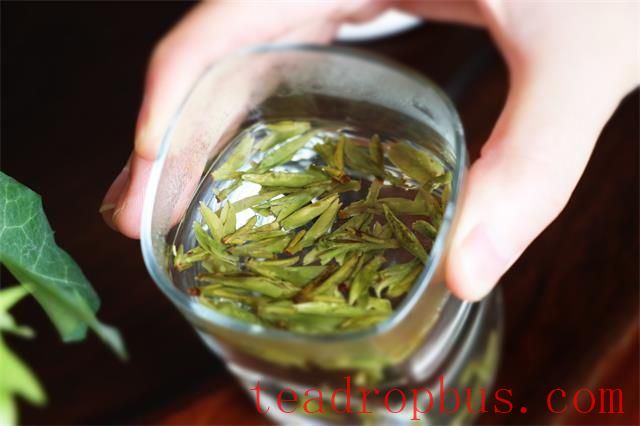The brewing method for Green Tea can be adjusted according to personal taste and preference. For example, you can try brewing green tea at different water temperatures to find the flavor that best suits your palate. Additionally, you can add petals, lemon, or other ingredients to create a taste profile that you enjoy. Besides being delicious, green tea can offer better Health benefits when combined with other foods.

What Kind of Tea Utensils Should Be Used to Brew Green Tea?
As mentioned earlier, green tea is an unfermented tea and relatively tender, so it is not suitable for utensils that are too airtight. A glass cup is a good choice because it is open and has excellent breathability. Additionally, as it is transparent, it allows you to observe the appearance of the green tea in the cup from the outside. In particular, delicate or high-grade green teas should be brewed in a glass cup, which makes it easier to appreciate the beauty of the interaction between the green leaves and the water, as they float gracefully on the surface or in the water, appearing playful and charming.
However, not all types of green tea are suitable for brewing in a glass cup. Only high-quality, premium green teas are well-suited, while medium- and low-grade green teas can be brewed in a clay Teapot or covered bowl. Since medium- and low-grade green teas tend to be coarser in texture, using a glass cup may highlight their imperfections, which may not be visually appealing. Using a covered bowl or clay teapot can help hide these flaws, and lower-grade green teas are less prone to becoming overly steeped, making them suitable for brewing in a clay teapot.

Can Drinking Green Tea Cause Insomnia?
In general, whether drinking green tea affects sleep depends on the time and quantity of consumption, and this varies from person to person. Here's a specific analysis:
1. Does Not Affect Sleep: If you only occasionally drink green tea and consume moderate amounts during the day, green tea generally has a minimal impact on sleep. Most of the components in green tea that affect sleep will be metabolized out of the body before bedtime, typically not interfering with sleep.
2. Can Affect Sleep: If you drink large quantities of green tea over extended periods, especially strong tea consumed close to bedtime, and if your sleep quality is already poor, it is likely to affect your sleep. The Caffeine and theophylline in green tea can cause nervous system excitement, leading to difficulty falling asleep and reduced sleep quality.
Generally, drinking some green tea during the day can help refresh the mind, but it is best not to drink green tea before bedtime, as it can lead to insomnia. Instead, you can drink warm milk before bedtime to aid sleep.

The Benefits and Effects of Regular Green Tea Consumption
1. Green Tea Anti-Aging
The antioxidants in green tea help combat aging. During human metabolism, if there is excessive oxidation, a large number of free radicals are produced, which can accelerate aging and damage cells. SOD (Superoxide Dismutase) is a free radical scavenger that can effectively clear excess free radicals and prevent them from harming the body. The catechins in green tea can significantly increase the activity of SOD and eliminate free radicals.
2. Green Tea Antibacterial
Research shows that the catechins in green tea have inhibitory effects on certain bacteria that can cause disease in humans while not harming beneficial bacteria in the intestines. Therefore, green tea has a role in regulating the digestive system. Studies have shown that tea polyphenols can remove harmful free radicals in the body and regenerate highly effective antioxidants such as α-VE, VC, GSH, and SOD, thus protecting and repairing the antioxidant system. Regular consumption of green tea can reduce blood sugar, lipids, and blood pressure, helping to prevent cardiovascular diseases. Researchers from Showa University found that in a solution of 1/20th the concentration of regular tea containing tea polyphenols, after placing 10,000 highly pathogenic E. coli O-157 bacteria, all of the bacteria were killed within five hours, without a single one remaining.
3. Green Tea Reduces Lipid Levels
Animal experiments conducted by scientists have shown that the catechins in tea can reduce plasma total cholesterol, free cholesterol, low-density lipoprotein cholesterol, and triglyceride levels. Human trials have indicated that green tea can inhibit platelet aggregation and reduce the incidence of arteriosclerosis. Green tea contains flavonoids, which have antioxidant properties and can prevent blood clots and platelet aggregation, reducing the risk of cardiovascular diseases.

4. Green Tea Promotes Weight Loss and Fat Reduction
Green tea contains theophylline and caffeine, which can activate various enzymes including protein kinases and triglyceride lipases, reducing the accumulation of fat cells, thereby contributing to weight loss.
5. Green Tea Prevents Tooth Decay and Freshens Breath
Green tea contains fluoride, and the catechins in it can inhibit the bacteria that cause tooth decay, reducing the formation of dental plaque and periodontal disease. The tannins in tea have antibacterial properties that can prevent the growth of bacteria in food residue, effectively preventing bad breath.
When choosing green tea, you should opt for high-quality tea leaves and avoid those that contain added chemicals. It's important to note that while green tea offers many benefits, it is not suitable for everyone. For example, pregnant women, nursing mothers, and individuals with cold constitutions should avoid or limit their consumption. Regularly drinking green tea is a healthy lifestyle choice, but it's essential to select high-quality tea, combine it properly with other foods, and consume it in moderation.